by Gina Brummett | Apr 1, 2020 | Devotions
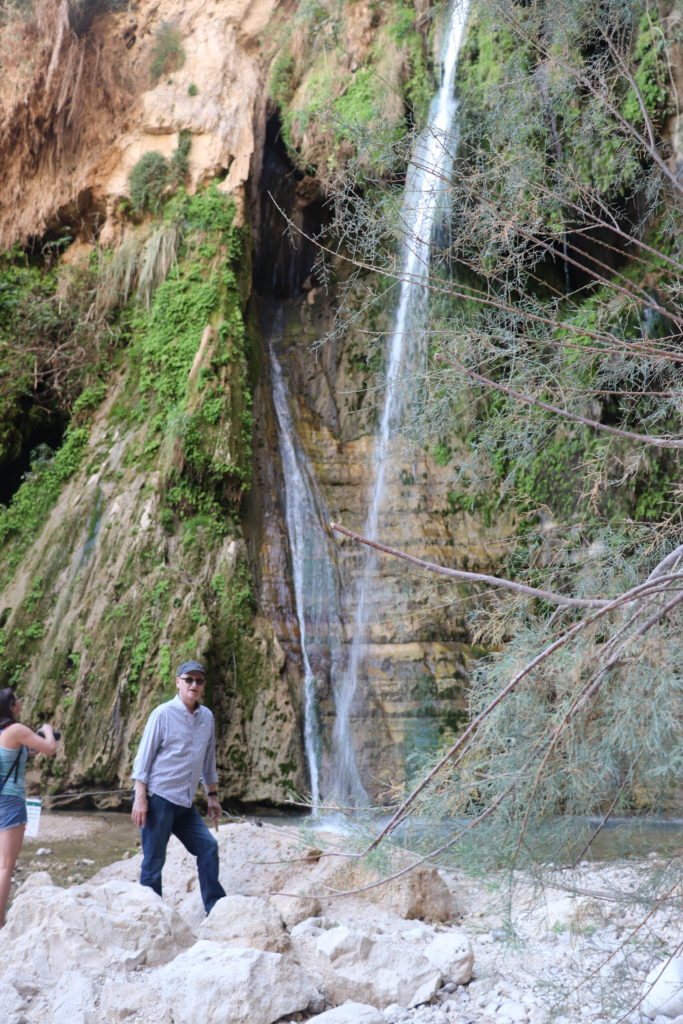
Waterfall at En Gedi National Reserve
We tracked a LOT of steps touring Israel, and a couple of times I took a picture of my foot (dipping my toe into the Sea of Galilee, for example). Very often and in many places I mused, “Just think, I’m stepping right where [Bible character] did!” That happened as we hiked the En Gedi Nature Reserve, and we talked about David hiding there from King Saul. (1 Samuel 24)
King Saul, paranoid and jealous of David’s success and rising popularity, was searching for David to take his life. If it were a movie, this would be one of the cliff hangers, with a little comedy thrown in. Saul is scouring the landscape and suddenly needs a “pit stop”. He darts into a cave, and amazingly it is the same cave where David and some of his men are hiding. While Saul’s guard (and his garments) are down, David creeps near him with the incredible opportunity to save his own life by taking Saul’s! But David, at the last second, redirects his spear and slices off a corner of Saul’s robe. The Bible tells us that David was ashamed of himself as he held that slice of cloth and envisioned what he had nearly done – taken the life of his king.
Oblivious, Saul leaves the cave to resume his search, and David runs out into the open air, calling after Saul. Desperately trying to convince Saul that he means him no harm, David produces the patch of cloth. Saul must have turned as white as the foamy water cascading down the nearby cliff as he grabbed his robe and verified his close call with death.
Actually, I think both men were dumbfounded as they held in their hands evidence of “what almost was”. I wonder if that bit of Saul’s robe ended up somewhere that David saw it often and remembered that God kept him from an action that he would regret. I wonder if Saul refused to have the robe mended, so that he would remember David’s mercy. The succeeding chapters reveal other occasions when David remembered to be merciful (and times when Saul forgot).
Still, a swatch of fabric reminds us about mercy. I like mementos (hence the sneaker photos), and I’m thinking that Jesus likes mementos, too. He gave us the idea – command, actually – to partake of communion together as a reminder of His sacrificial death. (Matthew 26:26; 1 Corinthians 11:26) “As often as we do it”, we hold in our hands a little juice and bread as evidence that “what almost was“ (our death penalty) mercifully was replaced by eternal life.
by Gina Brummett | Mar 26, 2020 | Devotions
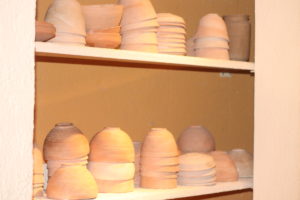 My women’s ministries friends, aka the “WMs” – who’ve attended hundreds of Bible studies and served even more community meals– will love learning about Qumran! We were privileged to visit this archeological discovery on our second tour day in Israel.
My women’s ministries friends, aka the “WMs” – who’ve attended hundreds of Bible studies and served even more community meals– will love learning about Qumran! We were privileged to visit this archeological discovery on our second tour day in Israel.
Located near the Dead Sea, Qumran’s fame comes from a break-away sect, known as the Essenes, who lived and studied there. In the surrounding caves, they left a magnificent legacy that we now call the Dead Sea Scrolls.
From the Qumran National Park publication: “The Essenes paid great attention to ritual bathing and purity. They lived a communal life in a settlement that was constructed to make them as self-reliant as possible. They had assembly halls, a central dining room in which ceremonial meals were eaten, a kitchen, ritual baths, a laundry room, a watch tower, a stable and a pottery workshop. Of special interest is the Scriptorium – the writing room – with its desks and ink stands, where the Essene scribes probably wrote most of the scrolls found in the adjoining caves.”
I loved learning that archeologists unearthed a dining and meeting hall and, in a nearby pantry, hundreds of pottery tableware pieces “neatly arranged in piles”. Give it up for a well-organized church kitchen that survived centuries and an earthquake!
Seriously, not too far removed in time or distance (by today’s standards) the early Christians were gathering around “the good book” and the table. “Day after day they met together in the temple. They broke bread together in different homes and shared their food happily and freely.” (Acts 2:46, CEV)
I wonder about the first follower of Christ who purposely came to the table “unwashed”. Who was the brave one who did not lather his hands, just so he could set up a dialogue that he’d first overheard from the lips of Jesus?
When Jesus finished speaking, a Pharisee invited him home for a meal. Jesus went and sat down to eat. The Pharisee was surprised that he did not wash his hands before eating. So, the Lord said to him: You Pharisees clean the outside of cups and dishes, but on the inside, you are greedy and evil. (Luke 11:38-39)
Currently, in the middle of the coronavirus pandemic, we’re constantly reminded, “Wash your hands!” That’s not only beneficial but necessary! Of even greater importance, though, is the need to cleanse our hearts. Scripture tells us:
Come near to God and he will come near to you. Wash your hands,
you sinners, and purify your hearts, you double–minded. (James 4:8)
Who may ascend the mountain of the Lord? Who may stand in his holy place? The one who has clean hands and a pure heart, who does not trust in an idol or swear by a false god. (Psalm 24:3-4)
So, let’s continue washing our hands and, at the same time, let’s allow the Holy Spirit to scrub our hearts and minds with the “soap” of God’s Word! (See Ephesians 5:26)
Stay safe, keep clean and be healthy!
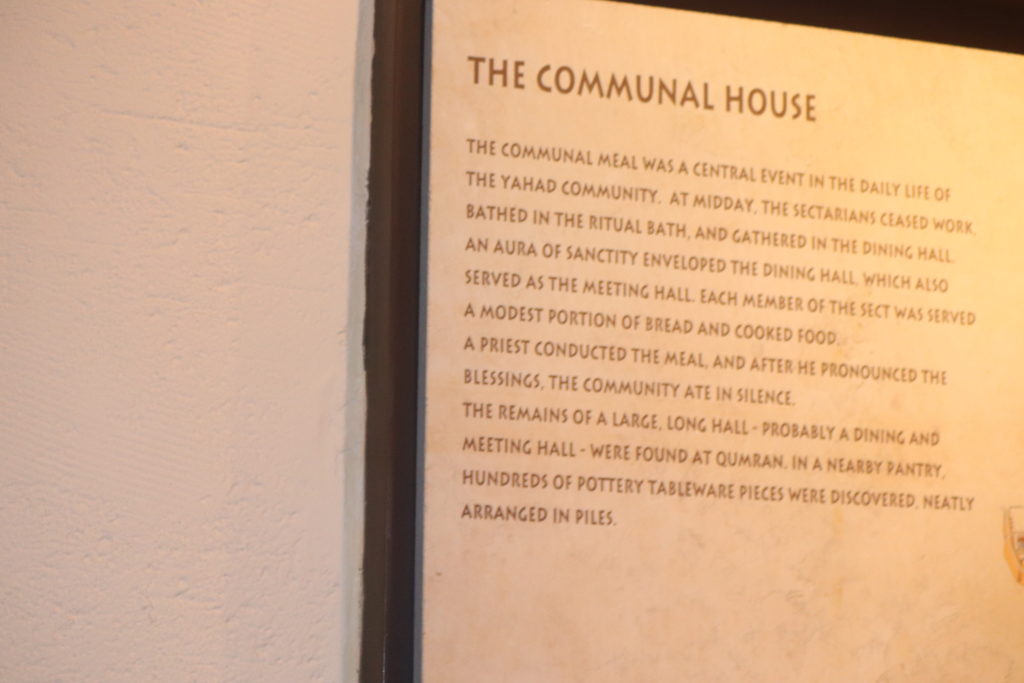
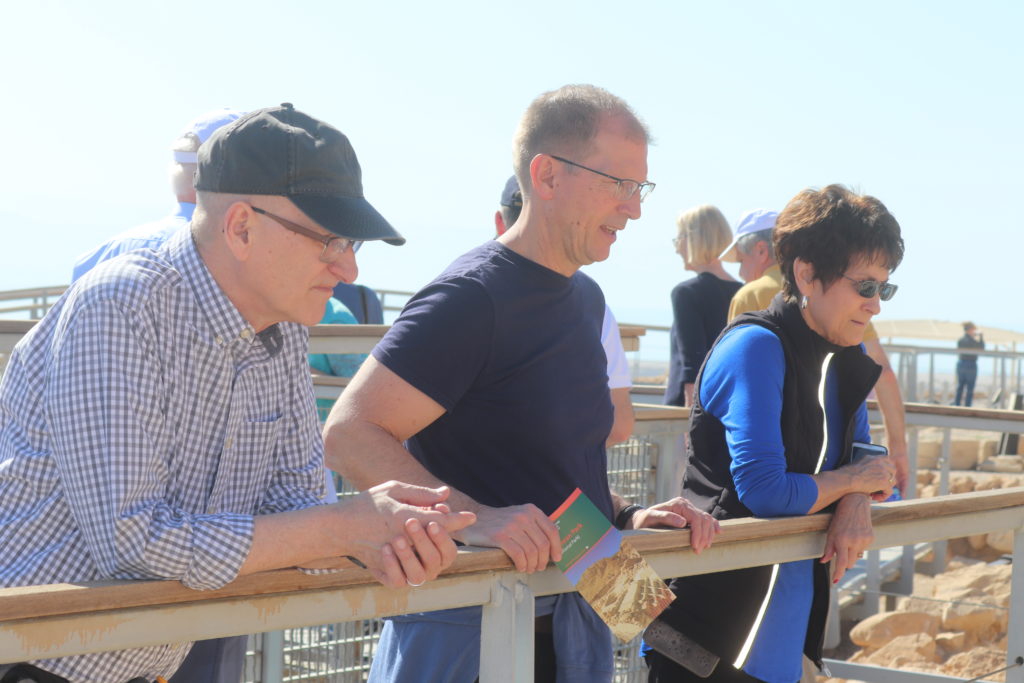
Jim, Scott and Jeanie looking into one of the many ritual baths uncovered at Qumran
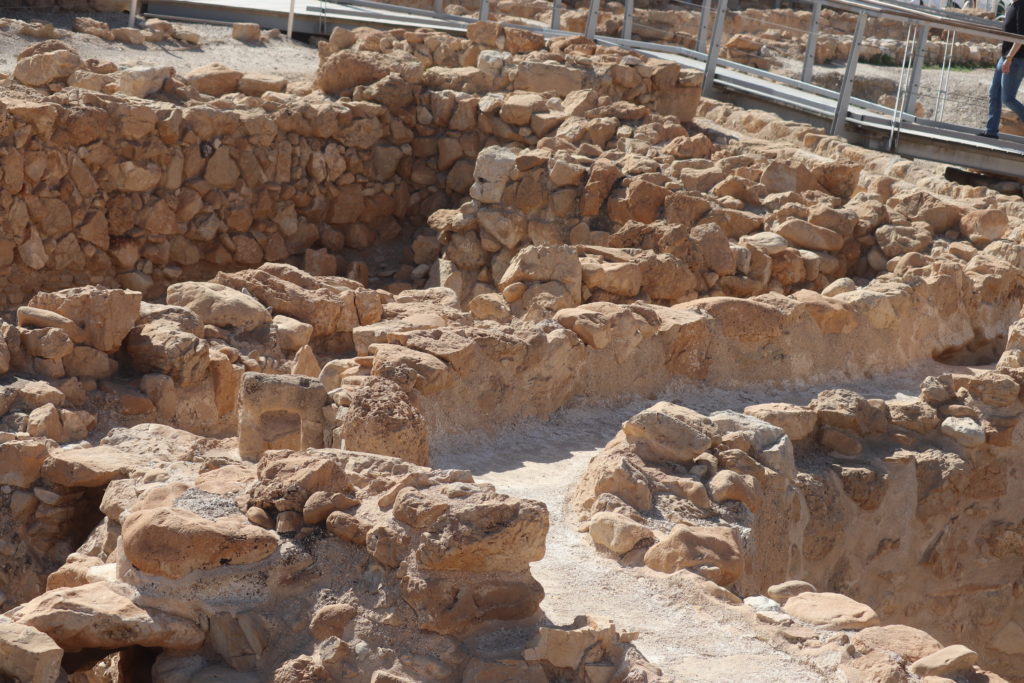
Ritual bath
by Gina Brummett | Mar 25, 2020 | Devotions
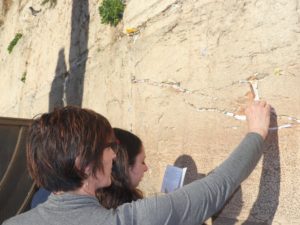
During this time we are “social distancing,” Jim and I are sharing some of our experiences in Israel earlier this month. As we planned our trip, I imagined being at the iconic Western Wall. This happened on our very first touring day, and the experience left me thinking a lot about the great privilege to be able to communicate with our living Lord.
Observant Jews enter the Western Wall plaza (which they consider the holiest site in Jerusalem, because of its proximity to the ancient Holy of Holies) and they carefully practice the protocol they have been taught for pleasing God in this place. The Western Wall has also been called the “Wailing Wall”, referring to the practice of Jews weeping at the site over the destruction of the Temples.
As I watched people gather to wash their hands before entering the plaza, I thought about the role of repentance in effective praying. I know that a clean conscience will help me have confidence as I present my needs to the Lord. Dear friends, if our hearts do not condemn us, we have confidence before God and receive from him anything we ask, because we obey his commands and do what pleases him. (1 John 3:21-22)
I observed women (by the way, there is a separation of men and women at the wall) reading from prayer books, and I saw what seemed to be thousands of written prayers inserted into the crevices of the wall. I know there is some mysticism associated with this practice, but I took a moment to write out the prayer that is always on my mind and not far from my lips these days – physical healing for my brother. I wedged my petition into the wall as a tangible response to the invitation, “Cast all your care on Him, for He cares for you.” (1 Peter 5:7) Then I joined hands with my cousins Jeanie and Laura, and we prayed for my brother.
And we prayed for Israel. May ritual give way to relationship!
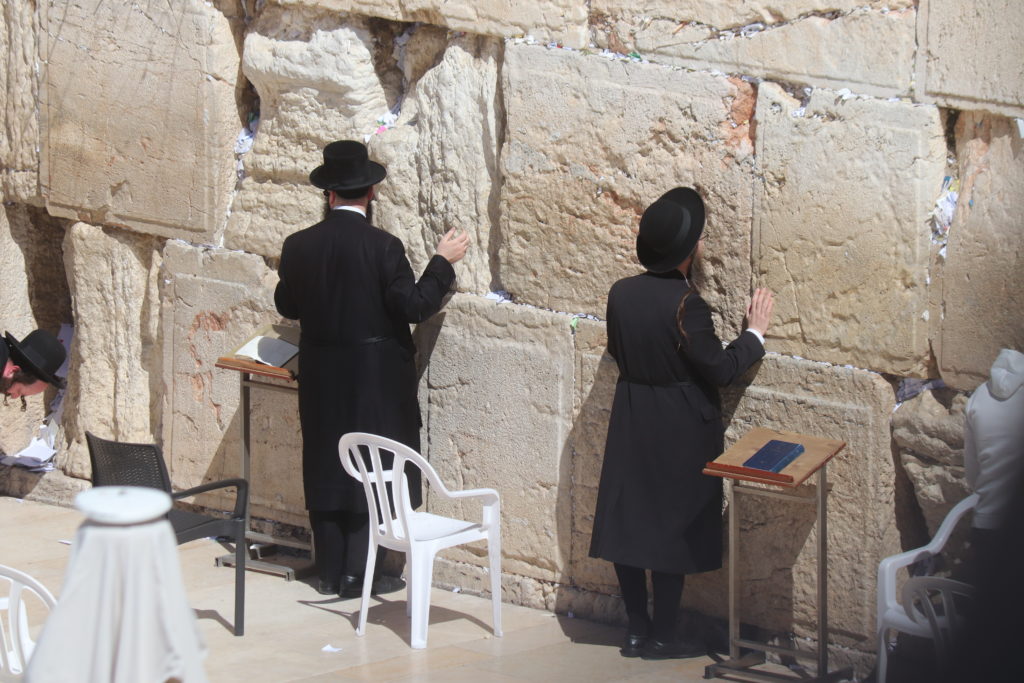
by Gina Brummett | Mar 19, 2020 | Devotions

In my devotional journal in January, I wrote, “What places will God meet me this year?”
That question came after reading the biblical account of the first murder (Genesis 4). Cain, in jealous rage, killed his brother Abel after Abel’s sacrifice to God was accepted and Cain’s sacrifice was not. God pronounced a curse over Cain, that left him homeless. (“You will be a restless wanderer on the earth.”)
Even before he expressed fear about his physical safety, Cain declared his expulsion from the land to be an unbearable punishment. (v. 13) “Today you are driving me from the land, and I will be hidden from your presence!”
In reality, we are never hidden from God’s view, and because He is omnipresent, we are never actually out of His presence. But we can be outside the fellowship of our Lord. The “ground” from which Cain was being expelled was the place where he had known God’s presence.
I reflected on places that have held spiritual significance for me. I revisited them mentally and contemplated what God did for me in each of those places. That’s a great exercise! When our son was a teenager, I stumbled onto his homework paper titled “My Favorite Place.” How delighted I was to read that his “favorite place” was the youth room of our church!
It’s an interesting time to be thinking about places of spiritual significance. My husband and I have just returned from Israel, where we visited many biblical sites (i.e. the tomb where Lazarus was resurrected at Jesus’ command, Elah Valley – where David killed Goliath, Cana – where Jesus performed his first miracle, and the list goes on!) Back at home, we’re enduring with everyone else the impact of the coronavirus pandemic. We’re especially saddened that the church cannot have public gatherings, and we are missing the in-person fellowship of our church family.
But it’s a good time to experience a special place of spiritual significance – HOME! A silver lining to isolation is the opportunity to meet God right where you live! If you are not in the habit of daily fellowship with the Lord, this is the time to begin! I predict you are going to love it so much that you will keep it up after life is back to normal and you are longing for a little seclusion!
by Gina Brummett | Feb 1, 2019 | Devotions
“Joash was seven years old when he became king, and did what the Lord considered right in the sight of the Lord all the days in which Jehoiada the priest instructed him” (2 Kings 11:21 & 12:2)
A seven year old king. Imagine. How in the world does a seven year old grow up to be a man who does what is right in the sight of God and successfully lead a nation? He didn’t just instinctively know how to do what was right in the sight of God; he was taught by the priest.
Consider this: Samuel was approximately 11 years old when he began to recognize the voice of God. Joseph was a teenager when he received dreams and visions from God. David was a teenager when he brought down Goliath. Mary was a teenager when she conceived the Christ Child.
Beloved, secular culture is fighting for the souls of our kids. Parents and grandparents, I implore you to be a Jehoiada and teach your children and grandchildren the stories in the Bible. The church is ready and willing to help. Capable teachers are in place every Sunday, eager to make the Bible come alive to their imagination.
Joash was a reformer who, early in his reign, repaired the Temple, restored true religion to Judah, and fought to destroy Baal worship. I pray for God to raise up a Joash in this generation. I also pray for a Jehoiada who will take seriously his responsibility to mentor the Joash.


 My women’s ministries friends, aka the “WMs” – who’ve attended hundreds of Bible studies and served even more community meals– will love learning about Qumran! We were privileged to visit this archeological discovery on our second tour day in Israel.
My women’s ministries friends, aka the “WMs” – who’ve attended hundreds of Bible studies and served even more community meals– will love learning about Qumran! We were privileged to visit this archeological discovery on our second tour day in Israel.




